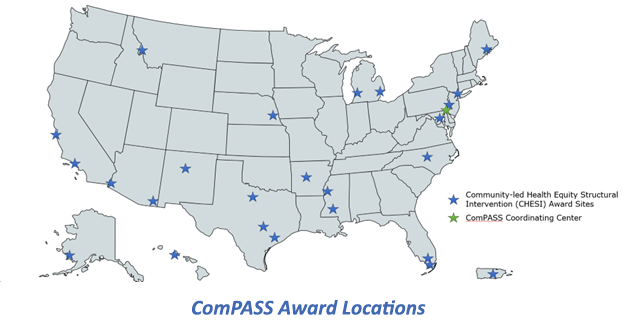Advancing health equity requires a sustained focus on addressing social determinants of health (SDOH), which are the conditions in which people are born, grow, learn, work, play, live, and age, and the wider set of structural factors shaping the conditions of daily life. These structural factors include social, economic, and legal forces, systems, and policies that determine opportunities and access to high-quality jobs, education, housing, transportation, information and communication infrastructure, healthy food, and health care.
To reduce health disparities and advance health equity, the National Institutes of Health (NIH) established the Community Partnerships to Advance Science for Society (ComPASS) Program. The NIH Common Fund recently made 25 awards directly to community organizations to develop and implement ComPASS Community-led Health Equity Structural Interventions (CHESIs) along with their chosen research partners. The innovative projects focus on developing structural interventions, which are efforts that attempt to change the social, physical, economic, or policy environments that may shape or constrain health behaviors and outcomes and create differences in opportunities to achieving optimal health.
The program will enable communities and researchers to work collaboratively as equal partners in all phases of the research process — from developing and launching the structural interventions in their communities to sustaining and disseminating the research findings. This research intends to promote healthy behaviors, improve health outcomes across diseases and conditions in communities most affected by health disparities, and inform social policies, systems, and practices to achieve optimal health for all.
Spread across the United States, the new CHESI projects span a variety of topics, health disparities, populations, and age groups. For example, a CHESI project based in the Watts neighborhood of Los Angeles, California, is developing a network of community gardens to increase access to healthy foods, green space, and physical activity, and create entrepreneurial opportunities for those living in this predominately African American and Latino community. This project will explore whether the community garden network decreases rates of preventable chronic diseases while also supporting economic development and social support and connection within the community. Another CHESI project, based in Miami-Dade County, focuses on improving access to quality health care for older adults from sexual and gender minority populations and creating culturally appropriate practices and policies in the local health system to foster more inclusive care. The funded community organization will measure how these changes in the local health system affect overall physical and mental health.
Focusing on families, a Bronx-based CHESI project, in collaboration with the New York City Housing Authority, will assess whether access to early childcare, education, and programming improves mental health and other health outcomes for children and their parents and guardians. Another award, based in rural communities in Maryland and Missouri, aims to increase telehealth care access and college preparatory programming for incarcerated people. These are just a few examples of the transformative and exciting ComPASS awards tackling upstream causes of health disparities. We are excited for the potential public health impact to come.
NIH also established a ComPASS Coordination Center to direct program administration and data coordination, in parallel with the CHESIs, and amplify the community organizations’ research and training efforts. The ComPASS Coordination Center will convene a National Health Equity Research Assembly (HERA) consisting of federal and non-federal partners in relevant SDOH fields to provide vital consultation. This year, ComPASS plans to make five additional awards to establish Health Equity Research Hubs that will provide specialized technical, partnership, and scientific assistance to the CHESIs.

Addressing the SDOH is an increasingly important area not only for NIH, but also for other federal agencies. In October 2023, the Biden-Harris Administration released the first-ever U.S. Playbook to Address Social Determinants of Health in which NIH SDOH research and resources, such as ComPASS, were highlighted. The Department of Health and Human Services (HHS) also released a Call to Action to Address Health Related Social Needs. The NIH SDOH Research Coordinating Committee, which was formed in 2022 and published a shared conceptualization in 2023, strengthens the NIH response to address SDOH.
SDOH research is essential to fulfilling NIH’s mission to enhance health, lengthen life, and reduce illness and disability; ComPASS is a crucial step toward this mission. ComPASS aims to increase the impact of the research so that the findings support individuals, communities, and populations in a manner that improves health, reduces health disparities, and advances health equity.
For more information about ComPASS, we encourage you to watch the ComPASS video and read the September 2023 NIH Press Release. The list of awards is available on the Common Fund ComPASS Funded Research page.
Eliseo J. Pérez-Stable, M.D.
Director, NIMHD
Shannon N. Zenk, PhD, MPH, RN
Director, NINR






